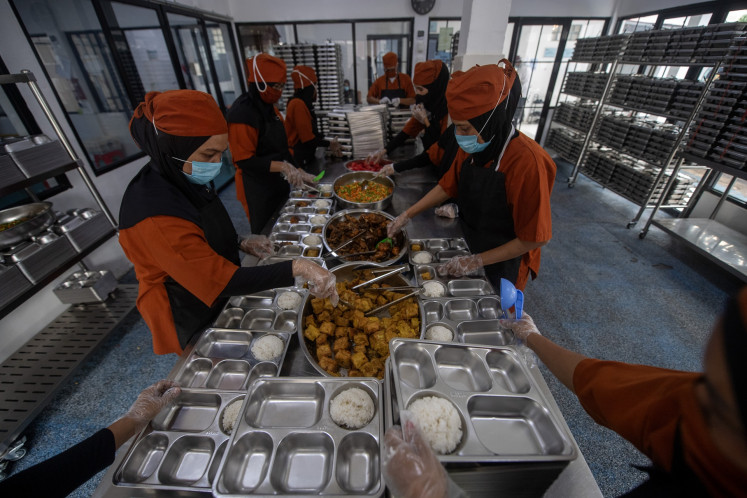Popular Reads
Top Results
Can't find what you're looking for?
View all search resultsPopular Reads
Top Results
Can't find what you're looking for?
View all search resultsLife for Chinese-Indonesian still beautiful
How does it feel to be of Chinese descent in Indonesia, a country where the authorities once banned Chinese New Year festivities and anything related to the Chinese culture? Ah, yes, during Soeharto's dictatorship, the Chinese had to hide their identity
Change text size
Gift Premium Articles
to Anyone
How does it feel to be of Chinese descent in Indonesia, a country where the authorities once banned Chinese New Year festivities and anything related to the Chinese culture?
Ah, yes, during Soeharto's dictatorship, the Chinese had to hide their identity. They were told to change their names, desist from speaking Chinese in public and if they wanted to celebrate the Chinese New Year -- known here as Imlek -- they had to do it quietly. No merry party, no joyful festival.
Things changed after Soeharto's downfall in 1998 following an economic crisis that sparked anti-Chinese riots -- an appalling part of Indonesian history that remains shrouded in ambiguity until today.
Now they can read Chinese newspapers, listen to Chinese radio and enjoy Chinese news programs on a private television. But unfortunately I, like many Chinese in Indonesia, never had the opportunity to learn the language.
Chinese New Year is now a public holiday, just like Idul Fitri, Christmas, Buddha's Day of Enlightenment and the Hindu Day of Silence.
They can celebrate the event cheerfully. There are fabulous lion dances performed cheerfully to the accompaniment of the powerful beating of drums and cymbals in shopping malls and many other public places with all of the dynamic movements and grandiose ornaments.
Hoorah ... everybody is happy!
Or perhaps not. I should say, everybody looks happy.
They smile. They laugh. But who knows what's inside their hearts? Just recently, I asked a young woman to share her feelings about being Chinese in Indonesia. She said she preferred that people not know she is Chinese.
"When people learn that I am Chinese, I feel intimidated," she said. She related that once, a colleague asked if she was Chinese and suddenly she had butterflies in her stomach.
"As a matter of fact, nothing bad happened after that, but I just felt uneasy," she said.
I was not that surprised. I know another Chinese woman who hates it when her native Indonesian co-workers call her cik (Chinese word meaning older sister) in the office because she feels that they mock her.
"I told them that I am Betawi," said the woman who was born in Jakarta 30 years ago.
OK, people might buy it because even though she has fair skin, unlike most Chinese people, she has big round eyes. Some of you may feel that the two Chinese women mentioned above are paranoid.
Or you may think that I made it up or exaggerate.
Let me tell you another story. It's about the country's pop legend Chrisye, who died at the age of 57 in March last year. I bet many of you (Indonesians) know of him, but I doubt if you know that when he was a kid, his friends made him a laughing stock, threw stones at him and yelled: Cina, Cina! Yes, Chrisye is Cina. This, however, was only revealed to the public a month before his death, when his biography was published.
Cina is the Indonesian word for China or Chinese.
How bad is it being Cina in Indonesia today?
Soeharto issued many regulations that discriminated against the Chinese. And his successors have repeatedly said that there should not be any discrimination against Chinese-Indonesians; that they should be treated like other Indonesians.
That is the theory. In practice, things are different.
The Chinese often become objects of extortion for corrupt officials. This is partly because there is a general perception that the Chinese are rich. While the Chinese constitute only 2 to 3 percent of the 234 million population, they play a crucial role in the country's economy.
The Chinese are also perceived as being greedy and stingy. On the other hand, some Chinese may regard themselves better than native Indonesians and accuse them of being stupid and lazy.
The other day I asked Mpok Kayak, my domestic helper, to buy a new padlock at a nearby store. It turned out, however, that the new padlock was broken, but when she wanted to exchange it for a good one, the storeowner asked her to pay another Rp 5,000. He argued that we should be responsible for the damage.
"Dasar Cina (Chinese are always like that)," she grumbled. I was flabbergasted. She definitely knows I am Chinese, and I don't think she really meant that I was as bad as the padlock seller, who apparently puts profit above anything. The words just popped out of her mouth and she said that because she was upset. Stereotypes or labels are hard to get rid of. I am sure that until this moment, even though the Chinese and indigenous Indonesians do seem to live in harmony, deep in their hearts some Chinese still do not feel really secure. And I am sure some indigenous Indonesians still dislike the Chinese, who are regarded as plunderers of their country's wealth.
Feeling insecure, the Chinese prefer to live in neighborhoods that are predominantly Chinese. Therefore, in Jakarta you will find some housing complexes with many Chinese, especially in North and West Jakarta, creating the impression that they build exclusive enclaves and do not want to mingle with indigenous Indonesians.
But it is not only the Chinese who fall victim to stereotyping. It also happens to other ethnic groups like the Betawi, who are often considered lazy and uneducated, and the Manadonese, who are thought to be hedonists.
Even though some people might have negative perceptions of Chinese-Indonesians and discriminate against them, life goes on. Well, actually it is not that bad. Despite some bitterness, there must be something sweet. Many Chinese-Indonesians lead decent lives and have proper jobs, some have even become Cabinet ministers like Mari Elka Pangestu, or journalists like me.
And they can also celebrate the Chinese New Year with lots of joy and enjoy themselves as many malls, restaurants, hotels and entertainment places hold special events to observe the day. It is time to leave the unpleasant things behind and just have fun.
Yes, life is not always fair. But it is still beautiful.










